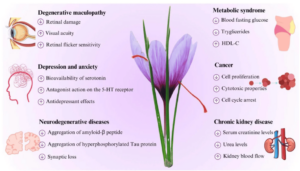Depression affects more than 280 million people worldwide, according to the World Health Organization. It’s a condition that reaches into every aspect of life – energy levels, sleep, motivation, even one’s identity. For so many, the path to healing begins with a diagnosis and a prescription for pharmaceutical antidepressants like Prozac (fluoxetine), an SSRI (selective serotonin reuptake inhibitor), which are clinically proven to reduce symptoms. But they come with some serious baggage: side effects like weight gain, sexual dysfunction, and the potential for severe emotional blunting, not to mention the stigma and dependency that often tag along.
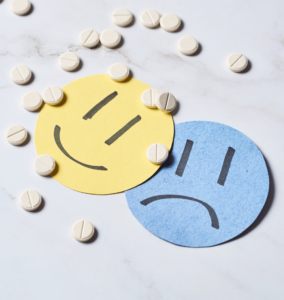
So what if an ancient herb could offer similar relief, without the harsh side effects?
Recent scientific literature is putting Crocus sativus, better known as saffron, into the spotlight. Known for its vibrant color and use in cooking, saffron has long been prized in traditional medicine systems like Ayurveda and Persian medicine. Now, a 2019 systematic review and meta-analysis led by Mojtaba Khaksarian and colleagues has shown that saffron may be just as effective as fluoxetine in treating mild to moderate depression.
Let’s unpack the findings – and what they mean for the future of holistic mental health care
Saffron vs. Placebo and Fluoxetine: The Study Breakdown
In this systematic review and meta-analysis, researchers analyzed multiple clinical trials comparing the effects of saffron, placebo, and fluoxetine (commonly prescribed at 20–40 mg per day) in patients diagnosed with depression. The main outcome measure was improvement in depression symptoms, most commonly assessed by the Hamilton Depression Rating Scale (HDRS).
What They Found
- Saffron showed significant improvement in depressive symptoms compared to placebo.
- The effect of saffron was comparable to fluoxetine, meaning it performed as well as the pharmaceutical gold standard.
- In some studies, saffron was also compared to imipramine, another common antidepressant, with similar results.
This is huge. It suggests that a naturally occurring compound, with a long history of human consumption, could work as effectively as a modern SSRI, potentially offering a significantly safer and more accessible route for some patients.
How Saffron Works: Beyond Serotonin
So what’s saffron actually doing in the brain? Here’s a breakdown of its mechanisms, according to the reviewed research:
Serotonin Reuptake Inhibition
Saffron appears to inhibit the reabsorption of serotonin at the synapse, similar to SSRIs. This increases the availability of this “feel-good” neurotransmitter in the brain, supporting mood regulation.
Antioxidant Defense
Saffron boosts antioxidant enzymes such as superoxide dismutase, catalase, and glutathione peroxidase, while reducing malondialdehyde, a marker of oxidative stress. Depression is increasingly associated with inflammation and oxidative damage in the brain, so these effects are likely significant.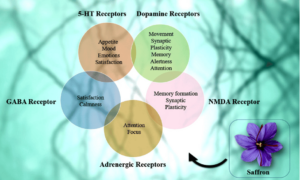
HPA Axis Modulation
The hypothalamic-pituitary-adrenal (HPA) axis regulates our stress response. Dysregulation here is often seen in depression. Saffron seems to help restore balance, potentially reducing chronic cortisol output and stress reactivity.
Neurogenesis and Brain Plasticity
Saffron appears to stimulate growth and repair in key brain areas affected by depression, especially the hippocampus, prefrontal cortex, and nucleus accumbens, which are responsible for mood, motivation, and reward.
Nutrient Density
Saffron contains over 150 bioactive compounds, including flavonoids, carotenoids (like crocins and crocetin), and essential vitamins (B1, B2) and minerals. These contribute to its anti-inflammatory, neuroprotective, and overall tonic effects.
Real-World Results: What the Clinical Trials Showed
Across the various trials included in the meta-analysis:
- Patients taking 30 mg of saffron per day (typically divided into two doses) experienced improvements similar to those on 20-40 mg of fluoxetine.
- The improvement was usually seen within 6-12 weeks.
- Importantly, side effects were minimal, usually limited to mild nausea or dizziness, significantly fewer than what’s often reported with SSRIs.
- No evidence of addiction, withdrawal symptoms, or sexual dysfunction was reported, although larger and longer-term studies are still needed.
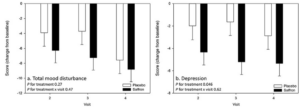
Limitations: What We Don’t Know Yet
Despite the promising data, the authors of the study were careful to point out several limitations:
- Small number of trials: The evidence base is still growing. Most studies were small in scale, and larger, randomized, placebo-controlled trials are needed.
- Geographic bias: All the studies included were conducted in Iran, which produces about 90% of the world’s saffron. Cultural or ethnic factors may influence treatment response.
- Short duration: Most trials ran for 6 to 12 weeks. Long-term efficacy and safety beyond three months have not been well studied.
Still, even with these limitations, the signal is clear: saffron holds legitimate antidepressant potential, especially for people looking for alternatives to pharmaceuticals.
The Big Picture: Why Saffron Matters in Mental Health
Saffron’s value isn’t just in its clinical effects, it’s in what it represents: a paradigm shift toward natural, holistic mental health care.
We’re seeing a growing cultural skepticism toward pharmaceuticals, especially among young people who want to feel empowered, not pathologized, on their healing journey. For these groups, saffron may offer:
- A sense of agency: You’re not a passive patient — you’re making informed, proactive choices about what goes into your body.
- Fewer side effects: Many people quit antidepressants because they don’t like how they feel on them. Saffron may support emotional balance without emotional dulling.
- A root-cause approach: With its antioxidant and anti-inflammatory actions, saffron addresses some of the deeper biological imbalances that may underlie depression.
Other Benefits of Saffron
Above, we mentioned saffron’s antioxidant and anti-inflammatory properties; we would be remiss in ignoring the other research-based benefits of supplementing with this ancient spice, including but not limited to:
- PMS and menstrual symptom relief

- Supports weight loss and appetite control
- Protects eye health
- Enhances cognitive function
- Improves memory and mental clarity
- Provides antioxidant and anti-inflammatory effects
- Neutralizes free radicals
- Supports healthy aging and reduces chronic inflammation
- Regulates blood sugar (early evidence)
- May improve insulin sensitivity
- Potential benefit for metabolic syndrome and type 2 diabetes
- Shows potential anti-cancer activity (in lab/animal studies)
- Inhibits cancer cell growth
- Promotes apoptosis in tumor cells
- Supports heart health
- May lower blood pressure and LDL cholesterol
- Improves arterial function
How to Use Saffron
Whether you are supplementing with saffron for mental health or its many other benefits, you want to make sure you do so correctly. If you’re considering saffron as a natural mood booster, here are some tips:
- Dose: Most clinical studies use 30 mg/day, divided into two 15 mg doses. Don’t confuse this with culinary saffron – standardized saffron extract (often labeled affron or satiereal) is what you want.
- Form: Capsules are the most convenient, but teas and tinctures are also available.
- Quality: Look for supplements tested for purity and standardized for crocins and safranal, the active compounds.
- Time: Allow at least 6 weeks to gauge its effects. It’s not an instant fix.
- Talk to your doctor: Especially if you’re on other medications, as saffron may interact with antidepressants or blood pressure meds.
Final Thoughts: Ancient Wisdom, Modern Day Results
For thousands of years, saffron has been revered for its uplifting, mood-enhancing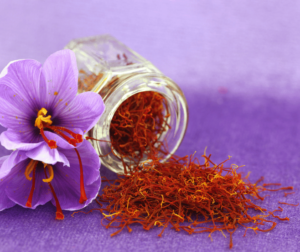 properties. Now, modern science is catching up. While it’s not a magic bullet – and shouldn’t replace medication without supervision – it offers a promising alternative for people navigating anxiety and depression.
properties. Now, modern science is catching up. While it’s not a magic bullet – and shouldn’t replace medication without supervision – it offers a promising alternative for people navigating anxiety and depression.
In a world overwhelmed by synthetic fixes and fast answers, saffron is a reminder that sometimes nature already has what we need, and ancient wisdom shouldn’t be overlooked.
Something that you might have otherwise disregarded could be just the thing you need…


